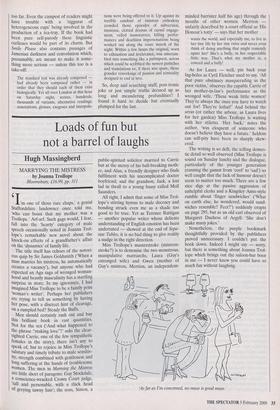Loads of fun but not a barrel of laughs
Hugh Massingberd
MARRYING THE MISTRESS by Joanna Trollope Bloomsbury, £16.99, pp. 311 'm one of those rare chaps,' a genial Staffordshire landowner once told me, 'who can boast that my mother was a Trollope.' Arf-arf. Such gags would, I fear, fall into the 'hearty' category of male Speech occasionally noted in Joanna Trol- lope's remarkable new novel about the knock-on effects of a grandfather's affair on the 'dynamics' of family life. The title itself has echoes of the notori- ous quip by Sir James Goldsmith ('When a man marries his mistress, he automatically creates a vacancy), but anyone who had expected an Aga saga of wronged woman- hood and beastly masculinity has a startling surprise in store. In my ignorance, I had Imagined Miss Trollope to be a faintly prim woman's writer'. Perhaps her publishers are trying to tell us something by having her pose, with a discreet hint of cleavage, on a rumpled bed? Steady the Buffs. Men should certainly rush out and buy this brilliant book in vast quantities. Not for the sex ('And what happened to the phrase "making love"?' asks the clear- sighted Carrie, one of the few sympathetic females in the story), there isn't any to sPeak of, but to rejoice in Miss Trollope's salutary and timely tribute to male sensitiv- ity, strength combined with gentleness and long suffering at the hands of troublesome Women. The men in Manying the Mistress are little short of paragons: Guy Stockdale, a conscience-wracked Crown Court judge, tall and personable, with a thick head of greying tawny hair'; the sons, Simon, a public-spirited solicitor married to Carrie but at the mercy of his ball-breaking moth- er, and Alan, a friendly designer who finds fulfilment with his uncomplicated doctor boyfriend; and the grandson, Jack, a lost lad in thrall to a young hussy called Moll Saunders.
All right, I admit that some of Miss Trol- lope's stirring hymns to male decency and bonding struck even me as a shade too good to be true. Yet as Terence Rattigan — another popular writer whose delicate understanding of English emotion has been underrated — showed at the end of Sepa- rate Tables, it is no bad thing to give reality a nudge in the right direction, Miss Trollope's masterstroke (mistress- stroke?) is to demonise the two monstrous, manipulative matriarchs, Laura (Guy's estranged wife) and Gwen (mother of Guy's mistress, Merrion, an independent- minded barrister half his age) through the mouths of other women, Merrion — unfairly described by a court official as 'His Honour's Witty' — says that her mother
wants the world, and especially me, to live in her tiny life by her tiny rules and never even think of doing anything that might remotely upset her! She's a bully, in her respectable little way. That's what my mother is, a coward and a bully!
As for Laura — well, pin back your lug-holes as Cyril Fletcher used to say. 'All that pure obstinacy masquerading as the poor victim,' observes the capable Carrie of her mother-in-law's performance as the wronged wife. 'These weak little women! They're always the ones you have to watch out for! They're lethal!' And behind the arras (or rather the arbour, as Laura lives for her garden) Miss Trollope is waiting with her stiletto. 'Her back,' notes the author, 'was eloquent of someone who doesn't believe they have a future.' Seldom can self-pity have been so sharply skew- ered.
The writing is so deft, the telling domes- tic detail so well observed (Miss Trollope is sound on Sunday lunch) and the dialogue, particularly of the younger generation (running the gamut from 'cool' to 'sad') so well caught that the lack of humour doesn't seem to matter too much. There are a few nice digs at the passive aggression of unhelpful clerks and a Kingsley Amis-style rumble about 'finger sandwiches' ('What on earth else, he wondered, would sand- wiches resemble? Feet?') suddenly erupts on page 295, but as an old earl observed of Margaret Duchess of Argyll: 'She don't make many jokes.'
Nonetheless, the purple bookmark thoughtfully provided by the publishers proved unnecessary. I couldn't put the book down. Indeed I might say — sorry, but there is something about Joanna Trol- lope which brings out the saloon-bar boor in me — I never knew you could have so much fun without laughing.
'As far as I'm concerned, no muse is good muse.'


























































 Previous page
Previous page